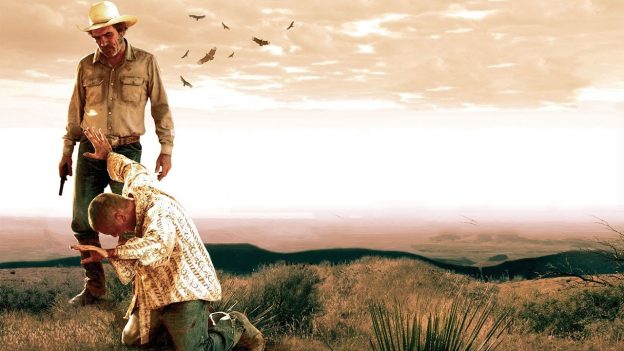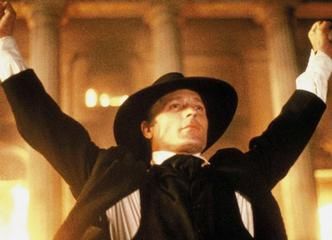Yasaman Rafiei 2017-08-09
The Three Burials is a great movie, mostly because of Tommy Lee Jones and his spectacular talents as an actor and a director, besides the touching screenplay of Guillermo Arriaga. The storyline was simple, inspired by a true story and right to the point: Pete Perkins (Tommy Lee Jones) was a middle-aged rancher who became a friend of a young, decent, timid cowboy named Melquíades. He was more than a friend to him, he was more than a friend to everyone; he was the father figure. When Melquíades was killed by Mike Norton (Barry Pepper), Perkins saw it in himself to carry out his will to have a worthy burial in his homeland while dragging Norton all the way with him.
In my opinion, Lee’s acting was perfect. He was so attached to his character as if he was a rancher his whole life. Moreover, as a director, he worked on the details of every other character and gave them a back story, each of which grabbed the attention of the viewer. One of the most breathtaking characters was the lonely blind man with a radio.
The movie was full of beautiful sceneries and splendid sunsets, full of impressive rural landscapes. All these were mixed with the colourful interiors of the Mexican side. On the other hand, the two predominant colours of grey and white in the American interiors mostly were reflected sadness and sorrow. This is why Pete pictured Mexico as the land of felicity and dreamed of living with his, so called, lover over the border. However, Mexicans had an opposing opinion and did their best to cross the border into their dreamland.
In this movie, all Mexicans were depicted welcoming, noble, and kind. The only Mexican who expressed some reasonable violence was Mariana, who after saving Mike, poured hot coffee on him, hit him on the nose and said: “now we are even!” However, even Mariana did not hold back her smile from Mike in the next scene. Given these differences, Jones mostly took sides with the Mexicans rather than his own compatriots.
We can see three turning points in Norton’s character. At the beginning of the movie, he was a violent and narcissistic person who saw himself superior to the others (Mexican). He came all the way down to Texas with the idea of saving his country’s borders as a patrol guard and tried to be the wall who stops the “others”. He saw everyone who passed the border as enemies and easily moved ahead to beat them. His violent, cold, and apathetic character was not only evident in front of Mexicans but also appeared in his behaviours towards his wife. In the second quarter of the movie, his personality is humiliated by Pete. In Mike’s eyes, Mexican were considered as low lives, thus, Pete forced him to go to Mel’s house, drink water from his mug, and wear his clothes. Another way of looking at this is that Pete, the father figure, wanted to teach Mike a lesson “before you judge a man, walk a mile in his shoes.”
After crossing the border, in the last half of the movie, Mike transitioned into his new personality by familiarizing with Mexicans. When he saw how he can interact with the “other”’s culture, and how intimate they could become, the space between him and the “others” collapsed. He started to accept Mexicans and comprehended the depth of the catastrophe that he had committed. These all shaped his new identity. He started experiencing the hybridity on the borderland. In the end, it is time for Mike’s redemption; mourning for Mel’s death and seeking forgiveness on his knees. His cries “I’m sorry, Melquiades! For taking your life, I’m sorry!” helped him free his soul.
Maybe the best line of the movie was the last one where Mike asks Pete “You gonna be all right?” This emphasizes how he had changed during his borderland journey. In just a few days, his whole life turned around, he saw many ups and downs and learned the meaning of loyalty, justice, and friendship.

